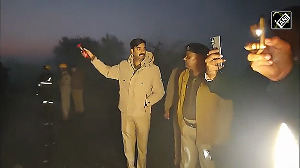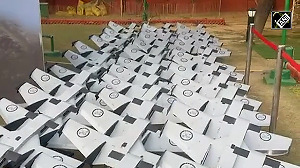More than 850 million hungry people around the globe can enjoy a better life if the world sets aside less than three per cent of what it spends on the purchase of arms every year, for the development of agriculture.
Pointing out the stark realities of the wasteful spending, United Nations Food and Agriculture Organisation director general Jacques Diouf on Tuesday appealed to world leaders for US$ 30 billion a year to re-launch agriculture and avert future threats of conflicts over food.
In his opening speech at the FAO's Rome Summit, called to defuse the current world food crisis, Diouf noted that in 2006 the world spent US$ 1.2 trillion on arms while food wasted in a single country could cost US$ 100 billion and excess consumption by the world's obese amounted to US$ 20 billion.
"Against that backdrop, how can we explain to people of good sense and good faith that it was not possible to find US$ 30 billion a year to enable 862 million hungry people to enjoy the most fundamental of human rights: the right to food and thus the right to life?" Diouf asked.
"It is resources of this order of magnitude that would make it possible definitely to lay to rest the spectre of conflicts over food that are looming on the horizon," he added.
"The structural solution to the problem of food security in the world lies in increasing production and productivity in the low-income, food-deficit countries," he declared.
This called for innovative and imaginative solutions, including "partnership agreements... between countries that have financial resources, management capabilities and technologies and countries that have land, water and human resources", he added.
The current world food crisis had already had tragic political and social consequences in different countries and could further endanger world peace and security, Diouf said.
But the crisis was in essence a 'chronicle of disaster foretold,' he noted. Despite the World Food Summit's solemn pledge in 1996 to halve world food hunger by 2015, resources to finance agricultural programmes in developing countries had not only failed to rise but decreased significantly since then.
Some US$ 24 billion would have been needed to fund an anti-hunger programme prepared for the second World Food Summit held in 2002, Diouf recalled.
"In cooperation with the FAO, the developing countries did in fact prepare policies, strategies and programmes that, if they had received appropriate funding, would have assured world food security," he added.
But, he said, "Today the facts speak for themselves: from 1980 to 2005 aid to agriculture fell from US$ 8 billion (2004 basis) in 1984 to US$ 3.4 billion in 2004, representing a reduction in real terms of 58 per cent".
Agriculture's share of Official Development Assistance fell from 17 per cent in 1980 to 3 per cent in 2006, he also noted.
The Director-General said he had alerted public opinion as far back as last September to the risks of social and political unrest due to hunger and that in December he had appealed for US$1.7 billion to help overcome the crisis by facilitating farmers' access to seeds, fertilizer, animal feed and other inputs.
"It is important to realise that the time for talking is long past," he stressed. "Now is the time for action".





